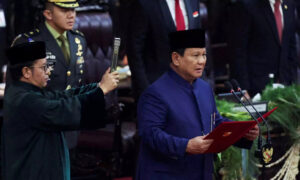Indonesia’s President Prabowo Subianto forms largest-ever cabinet with 109 members

Indonesia’s newly inaugurated President, Prabowo Subianto, has declared the largest cabinet in the country’s history, with 109 members. This move represents a considerable reform of the government, with various ministries being divided into more specialized positions. This expansion follows recent changes to parliamentary rules that removed constraints on cabinet size. Prabowo seeks to construct a broad-based and inclusive administration to consolidate power and address numerous national concerns. He emphasizes a strong and diversified government structure.
In an unprecedented political move, Indonesia’s newly elected President, Prabowo Subianto, has announced the country’s largest cabinet ever, with 109 members. This historic cabinet reshuffle reflects a purposeful effort to build a more inclusive and diverse administration, with an emphasis on specialized ministries to address critical national concerns.
Several ministries were split to allow for better governance, such as the separation of public works and housing, and the establishment of new ministries like the Ministry of Migrant Workers Protection. This restructuring reflects Prabowo’s vision of addressing modern challenges with precision and targeted governance.
By embracing a broader representation, Prabowo’s cabinet is seen as a way to consolidate political power and deliver effective policies for Indonesia’s diverse population. His approach also aims to strengthen the nation’s ability to address economic development, social welfare, and security concerns.
This significant expansion has been made possible by recent changes that lifted limitations on the number of cabinet ministers, allowing the president to appoint ministers based on merit and necessity rather than previous restrictions.
Prabowo’s cabinet will play a pivotal role in navigating Indonesia’s future as it faces challenges both at home and on the international stage. How this massive government team will work to shape Indonesia’s policies in the coming years remains a point of great interest for observers globally.

